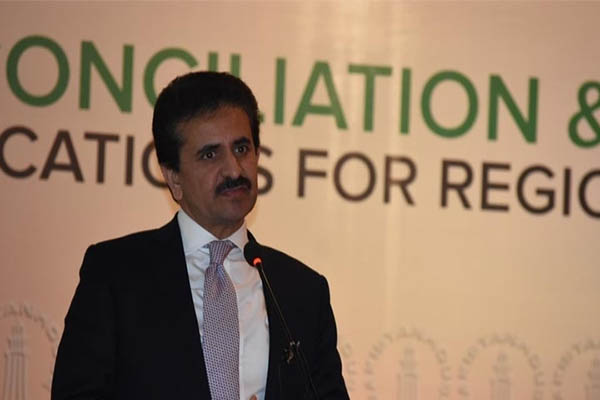
Foreign Office spokesperson Zahid Hafeez Chaudhri. Courtesy Ministry of Foreign Affairs
In weekly briefing, Foreign Office spokesperson reiterates that Islamabad’s ties with Beijing are not an impediment to relations with other countries
Iran is an important regional country and neighbor of Afghanistan, which is why Pakistan believes it has an important role to play in the ongoing Afghanistan Peace Process, Foreign Office spokesperson Zahid Hafeez Chaudhri said on Thursday.
“In the past, too, Pakistan has worked with Iran on the Afghan Peace Process, and we are ready to work with Iran in future also toward our shared objective of peace and stability in Afghanistan,” he told a weekly press briefing in Islamabad. To a question, he said Pakistan was the only country that had consistently maintained that there was no military solution to the conflict in Afghanistan. “Now, the entire international community has come to the same conclusion,” he said.
“We have played an important role in the Afghan Peace Process. As a result of Pakistan’s efforts three key milestones. i.e. U.S.-Taliban Peace Agreement, the initiation of Intra-Afghan negotiations, and the Agreement on Rule and Procedures were achieved last year,” he added.
He also summarized additional ways through which Pakistan had played an important role in the development of Afghanistan, including the construction of roads, hospitals and educational facilities. “We have offered over 6,000 scholarships to Afghan students as part of our efforts to help build human resources in Afghanistan,” he said, adding that Pakistan remained concerned about the security situation in Afghanistan, and had repeatedly called for a reduction in violence and permanent ceasefire.
“We believe progress in the Afghan peace process is critical for peace and stability in Afghanistan. An inclusive, broad based and comprehensive political settlement is, therefore, the best way forward and to achieve that all Afghan sides need to show flexibility,” he added.
Pak-China ties
During his briefing, Chaudhri said that Pakistan believed that its ties with China were not an impediment to its relations with other states because its foreign policy was based on friendliness and goodwill toward all nations. “We want close, cooperative relation with all others. We desire close, cooperative relations with the U.S. We want to broaden the scope of these relations, particularly in the areas of trade and investment,” he said, noting there was convergence on several issues, particularly the Afghan Peace Process. “Close cooperation between Pakistan and U.S has contributed to the progress achieved in Afghan Peace Process so far,” he claimed.
He also clarified that he did not believe the Pakistan-U.S. relationship was deteriorating. “The two sides remain committed to maintain close coordination on all matters of common interest. The two sides also continue to work closely on the Afghan Peace Process,” he said.
Referring to Prime Minister Imran Khan’s statements on Pakistan’s ties with China, the spokesperson said the two countries had an “all-weather, strategic cooperative partnership” that spanned decades. “The China-Pakistan Economic Corridor has taken this relationship to new heights. It has contributed significantly to the development of ports, roads and energy infrastructure in Pakistan,” he said. “CPEC has now entered into second phase with focus on industrial cooperation, trade, agriculture and socio-economic development,” he added.
Kashmir and Palestine
To a question, the Foreign Office spokesperson reiterated that there was no change in Pakistan’s principled position on the Palestine issue. “Pakistan has consistently called for a two-state solution, with pre-1967 borders and Al-Quds Al-Sharif as the capital of Palestinian State,” he said.
He also welcomed a report issued by the United Nations Secretary General’s Office in which it had documented grave concerns over human rights violations of children in India-held Kashmir. He said the indiscriminate targeting of Kashmiris with pellet guns, causing excessive and permanent injuries, had been particularly highlighted in the report. “We call upon the international community to take cognizance of the plight of oppressed children in [India-held Kashmir],” he added.
“Pakistan strongly condemns the continuing Indian machinations aimed at denying the Kashmiri people their inalienable right to self-determination as enshrined in the relevant U.N. Security Council Resolutions,” he said, and branded last week’s meeting between Kashmiri leaders and Indian P.M. Narendra Modi as “yet another attempt” of Delhi’s to further marginalize the Kashmiri people.
“It is evident from what has been said by the participants after the meeting that reversal of the actions of Aug. 5, 2019 and full restoration of statehood is a unanimous demand. The meeting has also further exposed the falsehood of the Indian narrative of so-called normalcy,” he said.
